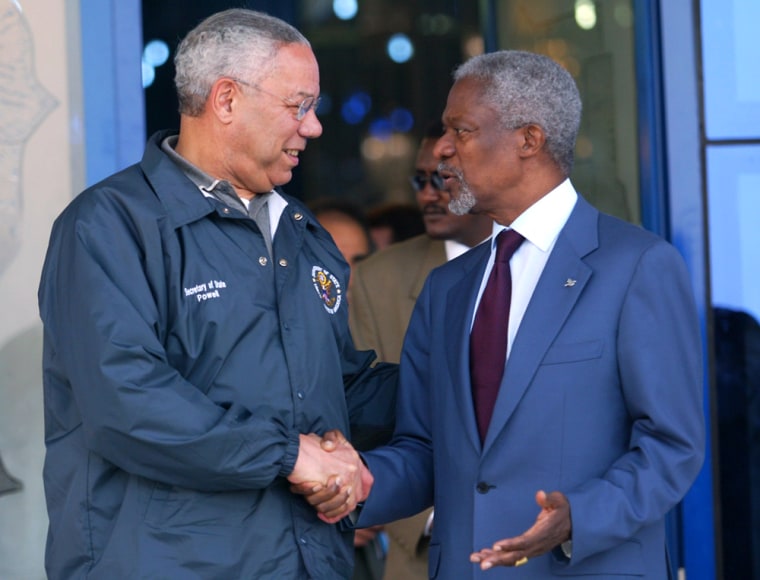U.N. Secretary-General Kofi Annan, visiting the troubled west of Sudan on Thursday, said the government must protect villagers from marauding Arab militias who have displaced 1 million people.
Annan arrived in Sudan on Wednesday and met with U.S. Secretary of State Colin Powell and Sudanese officials.
Powell said the United States wanted to see action within weeks on access for relief workers and disarming the Arab militias, known as Janjaweed, who human rights groups say are launching a campaign of ethnic cleansing in the Darfur region.
In the town of El Fasher, capital of North Darfur state, Annan met governor Osman Kebir to press home international demands that the Sudanese government stop a humanitarian crisis.
“The government responsibility is to ensure law and order so people can get on with their lives,” Annan said.
“We are all agreed security is extremely important. All measures must be taken to provide security so that the people will go back,” he added.
Annan was travelling to a camp for those displaced by Janjaweed looting and burning of African villages, about 11 miles south of El Fasher.
After years of conflict between nomadic Arab tribes and African farmers, two rebel groups revolted last year, accusing Khartoum of arming the Janjaweed, a charge the government denies. The United Nations says the fighting has created the world’s worst humanitarian crisis.
Powell puts pressure on Sudanese government
Powell on Wednesday said the U.N. Security Council might pass a resolution on Darfur if Sudan does not disarm the militias and allow full aid access to humanitarian agencies.
The United States has circulated a draft resolution imposing an arms embargo and travel ban on the Janjaweed, but it does not take action against the Sudanese government itself.
Sudanese Foreign Minister Mustafa Osman Ismail assured Powell that Sudan was working to achieve security in Darfur and would speed up negotiations with the rebels. The two sides signed a humanitarian cease-fire on April 8, but both sides have since accused each other of violations.
An aid organization working in Darfur said Annan’s visit was decisive for Darfur, where the imminent rainy season could soon make it impossible to reach vast areas.
“As far as we’re concerned, Annan’s trip is crunch time, last chance saloon for decisive international action on Darfur,” a representative of the group told Reuters in London.
“An immediate U.N. resolution on Darfur is vital and the best hope of stopping the killings, attacks and displacement of civilians,” said the representative, who declined to be named.
Aid worker blames both U.N., Khartoum
U.N. Emergency Relief Coordinator Jan Egeland told reporters in Darfur on Thursday that the United Nations was slow to act in Darfur, where aid workers say about 350,000 people could die this year of disease or malnutrition.
But he also blamed Khartoum for inaction.
“We have to admit that we are late in Darfur. The parties fought too long before reaching a cease-fire agreement,” he said. Khartoum blocked aid access for almost two months after the cease-fire, he added.
“The only thing in abundance in Darfur is weapons. It is easier to get a Kalashnikov than a loaf of bread,” he said.
The United Nations is fast increasing its presence ahead of the rainy season, but it still not enough,” he said.
“We’ve doubled our presence in Darfur over the last five weeks and we will double again in the next five weeks, but we still need to triple it,” he added.
The rains will make roads almost impassable and increase the threat of malaria and the spread of disease in the camps.
